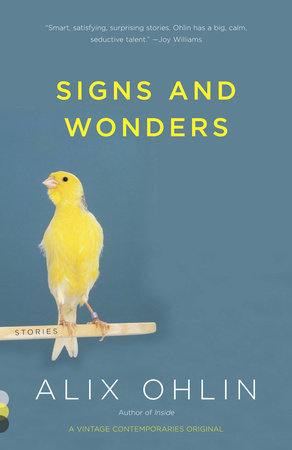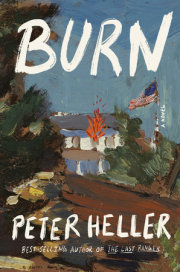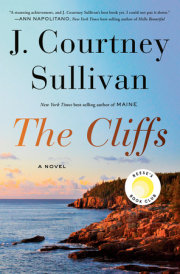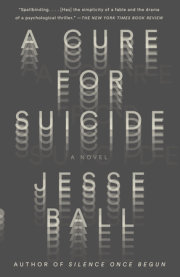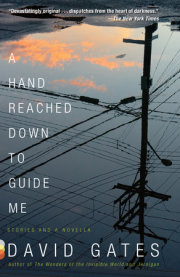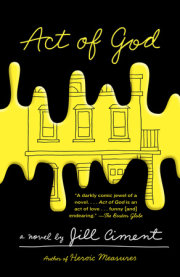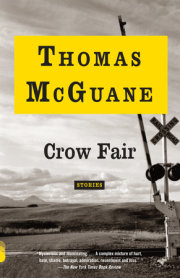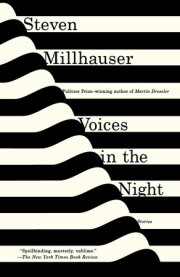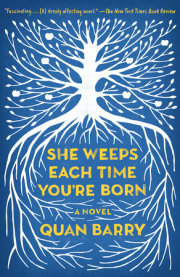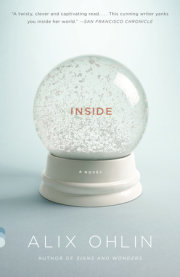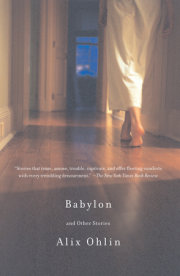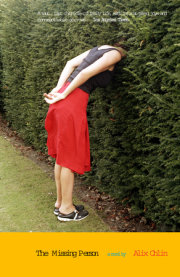These sixteen stories by the much-celebrated Alix Ohlin illuminate the connections between all of us—connections we choose to break, those broken for us, and those we find and make in spite of ourselves.
“Smart, satisfying, surprising stories. Ohlin has a big, calm, seductive talent.” —Joy Williams
“Ohlin has a marvelous will to explore and it’s clear that she’s in complete command of her art. These stories are smart, tough, deeply felt and beautifully delivered, without one wasted word. Signs and wonders, all right. I’ve seldom come upon a book so aptly titled for what’s inside, page to page.” —Richard Bausch
“Nothing short of marvelous. Olin writes like an Old Master, with confidence and clarity, a steady hand. She is immensely gifted, and every story here is a lucid chunk of reality—the flesh made word.” – Jay Parini
“With an emotional intelligence that is nearly telepathic and a great storyteller’s knack for riveting your attention from the opening line, Ohlin makes us understand that beneath everything that drives and distracts us there is, first and foremost, the struggle to love. She is a ferocious talent, a writer not only to watch but also to admire.” —Adam Ross
“I love the way Alix Ohlin’s stories teach us, with wit and tenderness, about those grown-up selves we don’t recognize; about the way our failures make us adults; and about how powerfully relieved we are to understand that, despite everything, our hearts can still move.” —Jim Shepard
“Ohlin’s stories are gripping from the get-go, and they don’t turn you loose. On virtually every page she surprised me and, more times than I could count, put a lump in my throat. She is one spectacular writer, and this is a beautiful book.” —Steve Yarbrough
"Unputdownable: crisp, focused, lovely, and lasting. . . . Sixteen stories about connectedness—between friends, families, and lovers—and the predicaments that come from navigating those relationships. Ohlin's characters are so genuine you'll be reminded of people you know, love, and hate. For better or worse, you may even see yourself in these pages." —Marie Claire
“Alix Ohlin working at the top of her powers… showing us in a remarkably mature and flat-out realistic style a new series of twists and turns in the lives of quite ordinary people – school teachers, women on the rebound, married folks and divorced folks, travelers, home bodies… There closely worked stories about life on earth – they soar.” —Alan Cheuse, NPR
“Calling all fans of Lorrie Moore, Deborah Eisenberg, and Robin Black: You have a new favorite writer [with a] deliciously addictive collection.” – Sheila Anne Fenney, Newark Star-Ledger
“Alix Ohlin’s wondrously engrossing Inside and Signs and Wonders display her characteristic strengths—dynamic plots, keenly observed settings, and characters so idiosyncratic, ambivalent, and contradictory they could be your family, your neighbors, people you work with…..She has a rare gift for examining the confusions of the 21st century, exploring the ways in which addictions, afflictions, attractions, and random impulses shape our lives. Her intense and beautifully shaped new novel and stories offer tentative yet illuminating answers.” – Jane Ciabattari, The Boston Globe
“Ohlin’s a master at drawing a character, a skill even more evident in the short story form, [and] she’s got a surgeon’s hand with the fine points of relationship dissection… Signs and Wonders makes me want to say to you, dear reader, one simple thing: Read this!” —Ian McGillis, Montreal Gazette
“Impressive… With enjoyably mordant humour and a surgical hand with relationship dissection… Ohlin crafts stories with consistent excellence.” —Brett Josef Grubisic, National Post
“One of the best story collections I’ve read in a decade… tough, original, funny and tragic, all at once.” —William McKeen, Creative Loafing Tampa
“Ohlin has a marvelous will to explore and it’s clear that she’s in complete command of her art. These stories are smart, tough, deeply felt and beautifully delivered, without one wasted word. Signs and wonders, all right. I’ve seldom come upon a book so aptly titled for what’s inside, page to page.” —Richard Bausch
“Nothing short of marvelous. Olin writes like an Old Master, with confidence and clarity, a steady hand. She is immensely gifted, and every story here is a lucid chunk of reality—the flesh made word.” – Jay Parini
“With an emotional intelligence that is nearly telepathic and a great storyteller’s knack for riveting your attention from the opening line, Ohlin makes us understand that beneath everything that drives and distracts us there is, first and foremost, the struggle to love. She is a ferocious talent, a writer not only to watch but also to admire.” —Adam Ross
“I love the way Alix Ohlin’s stories teach us, with wit and tenderness, about those grown-up selves we don’t recognize; about the way our failures make us adults; and about how powerfully relieved we are to understand that, despite everything, our hearts can still move.” —Jim Shepard
“Ohlin’s stories are gripping from the get-go, and they don’t turn you loose. On virtually every page she surprised me and, more times than I could count, put a lump in my throat. She is one spectacular writer, and this is a beautiful book.” —Steve Yarbrough
"Unputdownable: crisp, focused, lovely, and lasting. . . . Sixteen stories about connectedness—between friends, families, and lovers—and the predicaments that come from navigating those relationships. Ohlin's characters are so genuine you'll be reminded of people you know, love, and hate. For better or worse, you may even see yourself in these pages." —Marie Claire
“Alix Ohlin working at the top of her powers… showing us in a remarkably mature and flat-out realistic style a new series of twists and turns in the lives of quite ordinary people – school teachers, women on the rebound, married folks and divorced folks, travelers, home bodies… There closely worked stories about life on earth – they soar.” —Alan Cheuse, NPR
“Calling all fans of Lorrie Moore, Deborah Eisenberg, and Robin Black: You have a new favorite writer [with a] deliciously addictive collection.” – Sheila Anne Fenney, Newark Star-Ledger
“Alix Ohlin’s wondrously engrossing Inside and Signs and Wonders display her characteristic strengths—dynamic plots, keenly observed settings, and characters so idiosyncratic, ambivalent, and contradictory they could be your family, your neighbors, people you work with…..She has a rare gift for examining the confusions of the 21st century, exploring the ways in which addictions, afflictions, attractions, and random impulses shape our lives. Her intense and beautifully shaped new novel and stories offer tentative yet illuminating answers.” – Jane Ciabattari, The Boston Globe
“Ohlin’s a master at drawing a character, a skill even more evident in the short story form, [and] she’s got a surgeon’s hand with the fine points of relationship dissection… Signs and Wonders makes me want to say to you, dear reader, one simple thing: Read this!” —Ian McGillis, Montreal Gazette
“Impressive… With enjoyably mordant humour and a surgical hand with relationship dissection… Ohlin crafts stories with consistent excellence.” —Brett Josef Grubisic, National Post
“One of the best story collections I’ve read in a decade… tough, original, funny and tragic, all at once.” —William McKeen, Creative Loafing Tampa
From Chapter 1
So the important thing to know from the start is that she was miserable. She hadn’t always been, of course. She’d gotten married in a flurry of sex and promises, wearing a white dress so hideously confectionary that she felt like a parody of herself, a joke told in crinoline and lace, and even that made her happy, because it was silly and she knew they’d laugh about it later. Which they did. Then they had a baby, who was beautiful and perfect, then later on became less beautiful, less perfect, in fact troubled, for a time Ritalin and methamphetamine addicted, but subsequently, amazingly, pulled himself together and managed, despite the rocky years, to graduate from college and find a decent job at a zoo, tending to the turtles.
Which brings us to the misery, twenty-six years on. On the day she discovered she was miserable, Kathleen was forty-nine years old and a tenured professor of American literature at a college in suburban Philadelphia. Her husband, Terence, was fifty-two, and also tenured, in the same department at the same school. Their son, Steve, had been clean for three years. The mortgage had been paid. Financially, emotionally, and logistically, things were going pretty well. She and Terence were in a meeting, discussing whether or not to allow English majors to graduate without taking a course in Shakespeare. Tempers on this topic ran high, as they almost always did; the professors were a testy bunch, desirous of offense. Terence, the chair, argued this requirement was retrograde, absurd; everyone knew that English majors nowadays went on to marketing or advertising or law school.
“That’s true,” Kathleen said wearily, feeling obligated to support her husband. At one time, she’d worked hard to stake out her own positions, to be seen as objective and fair. She soon realized, however, that no matter what she said she would always be perceived as taking Terence’s side; even when she voted against him, this was interpreted as some kind of obscure but Machiavellian strategy the two of them had cooked up together. So she opted for the path of least resistance, which was to pretend, both at work and at home, that Terence was the most brilliant person she knew.
“Now, I love Shakespeare,” he said. Kathleen wondered if this was true. She hadn’t seen him read a book, any book, for pleasure, in the last decade. What he truly loved was reality television. He liked to root for the schemers and alliance forgers, praising them for their cunning amorality. Play the game, he would urge them out loud in the den, his voice tight with drama.
“I could happily spend the rest of my days,” he went on, “reading the plays and sonnets over and over again. But I’m a scholar. And we’re not preparing scholars, by and large, after all.”
“Surely you don’t mean to suggest that only literary scholars need to read Shakespeare?” Fleur Mason said. “Surely even you, Terence, aren’t that hostile to literature?”
Her even you hung in the room’s ensuing silence. In this group there was no such thing as a passing remark; each one was noted, parsed, enshrined. Fleur Mason looked right at Terence and didn’t flush. Young, square-shouldered, and passionate, she wore ruffled skirts and lace blouses and a gold cross on a chain; she seemed like someone who’d spent her childhood alone in a room, writing poems about trees. She didn’t belong to today’s world but refused, violently, to admit it.
“Surely even you, Fleur, aren’t so defensive and small-minded as to think that questioning literature’s practices is the same as being hostile to them,” Terence said smoothly.
It was almost five, and the others looked indiscreetly at their watches, anticipating blood-sugar crashes, child-care crises, cocktails tragically delayed.
“Maybe this is more than we want to get into right now,” Kathleen said diplomatically, for which she received a few grateful glances. But not from Fleur and Terence, both of whom were breathing hard.
Another half an hour passed, with no resolution reached on the Shakespeare requirement. Finally, after some in the room progressed from stuffing papers into their bags to standing up and moving to the door, Terence tabled the issue and adjourned the meeting, promising that next month they would communally endure the punishment of having to discuss it again.
Kathleen went back to her office, hoping to wrap up a few things, but all she could think about was her feverish irritation with Fleur Mason. It was ridiculous for her to be so difficult, so adamant. She obviously had to know that letting Terence have his way was the easiest course of action for everyone. Fleur had, in fact, always driven Kathleen crazy. She was single and thirty-seven and appeared to have no life outside of her job. She had a laugh like a demented clown’s; it rose too suddenly and lingered too long. There was also the profound and unforgivable stupidity of her name.
By six thirty everyone else had left, including Terence, who played squash with his friend Dave on Tuesday afternoons. Fleur’s office had once been Kathleen’s, and she still had the key. She walked down the hall, let herself in, and stood there for a moment, energized with hate. The room smelled like dust and Yankee Candle. There were framed New Yorker cartoons with literary jokes on the walls. And there was this: Fleur kept a bird in her office. God only knew why this was allowed but she’d brought in the bird—it was a parakeet—one semester when she was, she said, spending more time here than at home, and didn’t want it to be lonely. Now the bird was a permanent fixture, chirping all day long. Fleur put a blanket over the cage before leaving, and the bird went to sleep. Or so she said. When Kathleen lifted up the blanket, it wasn’t sleeping, just staring back at her with tiny, waxy, jelly-bean eyes. She opened the office door—there was no one around—and then the cage. She reached in and grabbed the bird in her hand, and in the instant before she threw it out into the hallway, where it confusedly took flight, its yellow wings scraping the walls, she could feel the frenzied, angry beating of its miniature heart against her palm.
***
She went home and cooked shrimp scampi, which she ate while listening to Terence hold forth on Shakespeare and the irrelevance of canonical literature in today’s digital world. When she glanced outside, a cardinal was sitting on the branch of an elm tree, looking back at her. She thought of the parakeet, trapped in the hallway of the Humanities Building or, alternately, flying around the campus, making its yellow way through a world it had never before seen. She felt remorseful, but also still corked with hate. Not a single thing had been exorcised from her soul.
At that moment, she understood—how belatedly!—that she detested not Fleur but herself, her own life, and most particularly her husband and his relentless occupation of that life. And that she’d hated all of this for a very long time.
“Terry,” she said.
He cocked his head at her, birdlike, chewing. Sometimes conversation seemed like something he’d read about in a magazine, never experienced firsthand. To him, her preferable role was that of mute audience. Anything she said in response, even her agreement, was liable to piss him off, and he’d storm away from the table, never clearing or washing the dishes, to scour the cable channels.
“Never mind,” she said.
Copyright © 2012 by Alix Ohlin. All rights reserved. No part of this excerpt may be reproduced or reprinted without permission in writing from the publisher.
About
These sixteen stories by the much-celebrated Alix Ohlin illuminate the connections between all of us—connections we choose to break, those broken for us, and those we find and make in spite of ourselves.
Praise
“Smart, satisfying, surprising stories. Ohlin has a big, calm, seductive talent.” —Joy Williams
“Ohlin has a marvelous will to explore and it’s clear that she’s in complete command of her art. These stories are smart, tough, deeply felt and beautifully delivered, without one wasted word. Signs and wonders, all right. I’ve seldom come upon a book so aptly titled for what’s inside, page to page.” —Richard Bausch
“Nothing short of marvelous. Olin writes like an Old Master, with confidence and clarity, a steady hand. She is immensely gifted, and every story here is a lucid chunk of reality—the flesh made word.” – Jay Parini
“With an emotional intelligence that is nearly telepathic and a great storyteller’s knack for riveting your attention from the opening line, Ohlin makes us understand that beneath everything that drives and distracts us there is, first and foremost, the struggle to love. She is a ferocious talent, a writer not only to watch but also to admire.” —Adam Ross
“I love the way Alix Ohlin’s stories teach us, with wit and tenderness, about those grown-up selves we don’t recognize; about the way our failures make us adults; and about how powerfully relieved we are to understand that, despite everything, our hearts can still move.” —Jim Shepard
“Ohlin’s stories are gripping from the get-go, and they don’t turn you loose. On virtually every page she surprised me and, more times than I could count, put a lump in my throat. She is one spectacular writer, and this is a beautiful book.” —Steve Yarbrough
"Unputdownable: crisp, focused, lovely, and lasting. . . . Sixteen stories about connectedness—between friends, families, and lovers—and the predicaments that come from navigating those relationships. Ohlin's characters are so genuine you'll be reminded of people you know, love, and hate. For better or worse, you may even see yourself in these pages." —Marie Claire
“Alix Ohlin working at the top of her powers… showing us in a remarkably mature and flat-out realistic style a new series of twists and turns in the lives of quite ordinary people – school teachers, women on the rebound, married folks and divorced folks, travelers, home bodies… There closely worked stories about life on earth – they soar.” —Alan Cheuse, NPR
“Calling all fans of Lorrie Moore, Deborah Eisenberg, and Robin Black: You have a new favorite writer [with a] deliciously addictive collection.” – Sheila Anne Fenney, Newark Star-Ledger
“Alix Ohlin’s wondrously engrossing Inside and Signs and Wonders display her characteristic strengths—dynamic plots, keenly observed settings, and characters so idiosyncratic, ambivalent, and contradictory they could be your family, your neighbors, people you work with…..She has a rare gift for examining the confusions of the 21st century, exploring the ways in which addictions, afflictions, attractions, and random impulses shape our lives. Her intense and beautifully shaped new novel and stories offer tentative yet illuminating answers.” – Jane Ciabattari, The Boston Globe
“Ohlin’s a master at drawing a character, a skill even more evident in the short story form, [and] she’s got a surgeon’s hand with the fine points of relationship dissection… Signs and Wonders makes me want to say to you, dear reader, one simple thing: Read this!” —Ian McGillis, Montreal Gazette
“Impressive… With enjoyably mordant humour and a surgical hand with relationship dissection… Ohlin crafts stories with consistent excellence.” —Brett Josef Grubisic, National Post
“One of the best story collections I’ve read in a decade… tough, original, funny and tragic, all at once.” —William McKeen, Creative Loafing Tampa
“Ohlin has a marvelous will to explore and it’s clear that she’s in complete command of her art. These stories are smart, tough, deeply felt and beautifully delivered, without one wasted word. Signs and wonders, all right. I’ve seldom come upon a book so aptly titled for what’s inside, page to page.” —Richard Bausch
“Nothing short of marvelous. Olin writes like an Old Master, with confidence and clarity, a steady hand. She is immensely gifted, and every story here is a lucid chunk of reality—the flesh made word.” – Jay Parini
“With an emotional intelligence that is nearly telepathic and a great storyteller’s knack for riveting your attention from the opening line, Ohlin makes us understand that beneath everything that drives and distracts us there is, first and foremost, the struggle to love. She is a ferocious talent, a writer not only to watch but also to admire.” —Adam Ross
“I love the way Alix Ohlin’s stories teach us, with wit and tenderness, about those grown-up selves we don’t recognize; about the way our failures make us adults; and about how powerfully relieved we are to understand that, despite everything, our hearts can still move.” —Jim Shepard
“Ohlin’s stories are gripping from the get-go, and they don’t turn you loose. On virtually every page she surprised me and, more times than I could count, put a lump in my throat. She is one spectacular writer, and this is a beautiful book.” —Steve Yarbrough
"Unputdownable: crisp, focused, lovely, and lasting. . . . Sixteen stories about connectedness—between friends, families, and lovers—and the predicaments that come from navigating those relationships. Ohlin's characters are so genuine you'll be reminded of people you know, love, and hate. For better or worse, you may even see yourself in these pages." —Marie Claire
“Alix Ohlin working at the top of her powers… showing us in a remarkably mature and flat-out realistic style a new series of twists and turns in the lives of quite ordinary people – school teachers, women on the rebound, married folks and divorced folks, travelers, home bodies… There closely worked stories about life on earth – they soar.” —Alan Cheuse, NPR
“Calling all fans of Lorrie Moore, Deborah Eisenberg, and Robin Black: You have a new favorite writer [with a] deliciously addictive collection.” – Sheila Anne Fenney, Newark Star-Ledger
“Alix Ohlin’s wondrously engrossing Inside and Signs and Wonders display her characteristic strengths—dynamic plots, keenly observed settings, and characters so idiosyncratic, ambivalent, and contradictory they could be your family, your neighbors, people you work with…..She has a rare gift for examining the confusions of the 21st century, exploring the ways in which addictions, afflictions, attractions, and random impulses shape our lives. Her intense and beautifully shaped new novel and stories offer tentative yet illuminating answers.” – Jane Ciabattari, The Boston Globe
“Ohlin’s a master at drawing a character, a skill even more evident in the short story form, [and] she’s got a surgeon’s hand with the fine points of relationship dissection… Signs and Wonders makes me want to say to you, dear reader, one simple thing: Read this!” —Ian McGillis, Montreal Gazette
“Impressive… With enjoyably mordant humour and a surgical hand with relationship dissection… Ohlin crafts stories with consistent excellence.” —Brett Josef Grubisic, National Post
“One of the best story collections I’ve read in a decade… tough, original, funny and tragic, all at once.” —William McKeen, Creative Loafing Tampa
Author
Excerpt
From Chapter 1
So the important thing to know from the start is that she was miserable. She hadn’t always been, of course. She’d gotten married in a flurry of sex and promises, wearing a white dress so hideously confectionary that she felt like a parody of herself, a joke told in crinoline and lace, and even that made her happy, because it was silly and she knew they’d laugh about it later. Which they did. Then they had a baby, who was beautiful and perfect, then later on became less beautiful, less perfect, in fact troubled, for a time Ritalin and methamphetamine addicted, but subsequently, amazingly, pulled himself together and managed, despite the rocky years, to graduate from college and find a decent job at a zoo, tending to the turtles.
Which brings us to the misery, twenty-six years on. On the day she discovered she was miserable, Kathleen was forty-nine years old and a tenured professor of American literature at a college in suburban Philadelphia. Her husband, Terence, was fifty-two, and also tenured, in the same department at the same school. Their son, Steve, had been clean for three years. The mortgage had been paid. Financially, emotionally, and logistically, things were going pretty well. She and Terence were in a meeting, discussing whether or not to allow English majors to graduate without taking a course in Shakespeare. Tempers on this topic ran high, as they almost always did; the professors were a testy bunch, desirous of offense. Terence, the chair, argued this requirement was retrograde, absurd; everyone knew that English majors nowadays went on to marketing or advertising or law school.
“That’s true,” Kathleen said wearily, feeling obligated to support her husband. At one time, she’d worked hard to stake out her own positions, to be seen as objective and fair. She soon realized, however, that no matter what she said she would always be perceived as taking Terence’s side; even when she voted against him, this was interpreted as some kind of obscure but Machiavellian strategy the two of them had cooked up together. So she opted for the path of least resistance, which was to pretend, both at work and at home, that Terence was the most brilliant person she knew.
“Now, I love Shakespeare,” he said. Kathleen wondered if this was true. She hadn’t seen him read a book, any book, for pleasure, in the last decade. What he truly loved was reality television. He liked to root for the schemers and alliance forgers, praising them for their cunning amorality. Play the game, he would urge them out loud in the den, his voice tight with drama.
“I could happily spend the rest of my days,” he went on, “reading the plays and sonnets over and over again. But I’m a scholar. And we’re not preparing scholars, by and large, after all.”
“Surely you don’t mean to suggest that only literary scholars need to read Shakespeare?” Fleur Mason said. “Surely even you, Terence, aren’t that hostile to literature?”
Her even you hung in the room’s ensuing silence. In this group there was no such thing as a passing remark; each one was noted, parsed, enshrined. Fleur Mason looked right at Terence and didn’t flush. Young, square-shouldered, and passionate, she wore ruffled skirts and lace blouses and a gold cross on a chain; she seemed like someone who’d spent her childhood alone in a room, writing poems about trees. She didn’t belong to today’s world but refused, violently, to admit it.
“Surely even you, Fleur, aren’t so defensive and small-minded as to think that questioning literature’s practices is the same as being hostile to them,” Terence said smoothly.
It was almost five, and the others looked indiscreetly at their watches, anticipating blood-sugar crashes, child-care crises, cocktails tragically delayed.
“Maybe this is more than we want to get into right now,” Kathleen said diplomatically, for which she received a few grateful glances. But not from Fleur and Terence, both of whom were breathing hard.
Another half an hour passed, with no resolution reached on the Shakespeare requirement. Finally, after some in the room progressed from stuffing papers into their bags to standing up and moving to the door, Terence tabled the issue and adjourned the meeting, promising that next month they would communally endure the punishment of having to discuss it again.
Kathleen went back to her office, hoping to wrap up a few things, but all she could think about was her feverish irritation with Fleur Mason. It was ridiculous for her to be so difficult, so adamant. She obviously had to know that letting Terence have his way was the easiest course of action for everyone. Fleur had, in fact, always driven Kathleen crazy. She was single and thirty-seven and appeared to have no life outside of her job. She had a laugh like a demented clown’s; it rose too suddenly and lingered too long. There was also the profound and unforgivable stupidity of her name.
By six thirty everyone else had left, including Terence, who played squash with his friend Dave on Tuesday afternoons. Fleur’s office had once been Kathleen’s, and she still had the key. She walked down the hall, let herself in, and stood there for a moment, energized with hate. The room smelled like dust and Yankee Candle. There were framed New Yorker cartoons with literary jokes on the walls. And there was this: Fleur kept a bird in her office. God only knew why this was allowed but she’d brought in the bird—it was a parakeet—one semester when she was, she said, spending more time here than at home, and didn’t want it to be lonely. Now the bird was a permanent fixture, chirping all day long. Fleur put a blanket over the cage before leaving, and the bird went to sleep. Or so she said. When Kathleen lifted up the blanket, it wasn’t sleeping, just staring back at her with tiny, waxy, jelly-bean eyes. She opened the office door—there was no one around—and then the cage. She reached in and grabbed the bird in her hand, and in the instant before she threw it out into the hallway, where it confusedly took flight, its yellow wings scraping the walls, she could feel the frenzied, angry beating of its miniature heart against her palm.
***
She went home and cooked shrimp scampi, which she ate while listening to Terence hold forth on Shakespeare and the irrelevance of canonical literature in today’s digital world. When she glanced outside, a cardinal was sitting on the branch of an elm tree, looking back at her. She thought of the parakeet, trapped in the hallway of the Humanities Building or, alternately, flying around the campus, making its yellow way through a world it had never before seen. She felt remorseful, but also still corked with hate. Not a single thing had been exorcised from her soul.
At that moment, she understood—how belatedly!—that she detested not Fleur but herself, her own life, and most particularly her husband and his relentless occupation of that life. And that she’d hated all of this for a very long time.
“Terry,” she said.
He cocked his head at her, birdlike, chewing. Sometimes conversation seemed like something he’d read about in a magazine, never experienced firsthand. To him, her preferable role was that of mute audience. Anything she said in response, even her agreement, was liable to piss him off, and he’d storm away from the table, never clearing or washing the dishes, to scour the cable channels.
“Never mind,” she said.
Copyright © 2012 by Alix Ohlin. All rights reserved. No part of this excerpt may be reproduced or reprinted without permission in writing from the publisher.
Back to Top
Notifications






